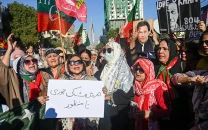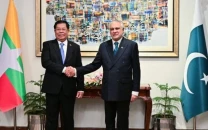JuD chief convicted of terror financing
ATC sentences Hafiz Saeed, his associate to five and a half years in jail

Hafiz Saeed. PHOTO: REUTERS
The court handed down a prison term of five years and six months and a fine of Rs15,000 in each of the case – collectively 11 years – but that will not affect the duration of the jail term with both sentences running concurrently.
The JuD chief has also been granted the benefit of Section 382-B of the Code of Criminal Procedure (reduction of period of sentence of imprisonment), which will reduce his sentence against the period he was detained prior to the conviction – around seven months in his case as he had been arrested in July last year.
Saeed’s associate, Malik Zafar Iqbal, was also found guilty in both the cases and handed the same sentence.
They were convicted under Section 11-N of the Anti-Terrorism Act (ATA), 1997 and sentenced to a five-year imprisonment with a fine of Rs10,000 on that count. They will also serve an additional six-month jail term in case they fail to pay the fine.
The two convicts have been handed down six months of jail time under Section 11-F(2) of the ATA with a fine of Rs5,000. In case of default, they will spend another 10 days in prison.
Section 11-N of the ATA prescribes the punishment for offences committed under Sections 11H to 11K, which pertain to fundraising, using personal assets, arranging funds or money laundering for the purpose of terrorism.
Under Section 11-F(2), a person is guilty of an offence if he is affiliated with or professes to belonging to a proscribed organisation.
The two cases – FIR No 32/2019 and FIR No 30/2019 – were registered by the Counter Terrorism Department (CTD) Gujranwala and CTD Lahore, respectively.
ATC Judge Arshad Hussain Bhutta conducted the proceedings in both the cases. The court had reserved the verdict in the cases after hearing arguments of the parties last week. The court had recorded the statements of 23 witnesses during the course of proceedings.
On July 3 last year, 13 top leaders of the banned outfit, including its chief Hafiz Saeed and Naib Emir Abdul Rehman Makki, were booked in nearly two dozen cases of terror financing and money laundering under the ATA. Hafiz Saeed was later arrested by the CTD on July 17 while he was travelling between Gujranwala and Lahore.
The CTD, in a major crackdown against terror financing last year, registered 23 cases against Saeed and 12 aides for using five trusts to “funnel funds to terror suspects”.
The CTD said it had registered cases under the ATA in Lahore, Gujranwala and Multan against the leadership of banned outfits JuD, Lashkar-e-Taiba (LeT) and Falah-e-Insaniyat Foundation (FIF). Hafiz Saeed, 70, says he is not linked to any group, although he heads the JuD, which is alleged to be the charitable arm of the LeT.
The accused were raising funds using five trusts — Dawatul Irshad Trust, Moaz Bin Jabal Trust, Al Anfaal Trust, Al Madina Foundation Trust and Alhamd Trust.
Those booked included Hafiz Saeed’s brother-in-law Abdul Rehman Makki, Ameer Hamza, Yahya Aziz. Malik Zafar Iqbal, Muhammad Naeem, Mohsin Bilal, Abdul Raqeeb, Dr Ahmad Daud, Dr Muhammad Ayub, Abdullah Ubaid, Muhammad Ali and Abdul Ghaffar.
The assets of these organisations and individuals were frozen and taken over by the state.
They were accused of “promoting terrorism and raising funds to facilitate terror activities”. According to the CTD, these proscribed outfits were operating under the guise of charities and raising funds for terror financing, the CTD said.
Hafiz Saeed's conviction comes days ahead of a key meeting of the Financial Action Task Force (FATF), an intergovernmental watchdog that monitors terrorism and criminal financing laws, in Paris.
The FATF will be issuing a decision on whether Pakistan has taken sufficient steps to avoid being “blacklisted”, a designation that would come as a blow to the country’s struggling economy.
The government had placed the JuD and the FIF in its list of banned outfits in February last year and decided to launch a crackdown on the Jaish-e-Muhammad, which was banned in 2002 by then military ruler General Pervez Musharraf.
The decision was made to take action against the individuals and organisations banned by United Nations Security Council. The LeT too is among the list of proscribed outfits since 2002.


















COMMENTS
Comments are moderated and generally will be posted if they are on-topic and not abusive.
For more information, please see our Comments FAQ